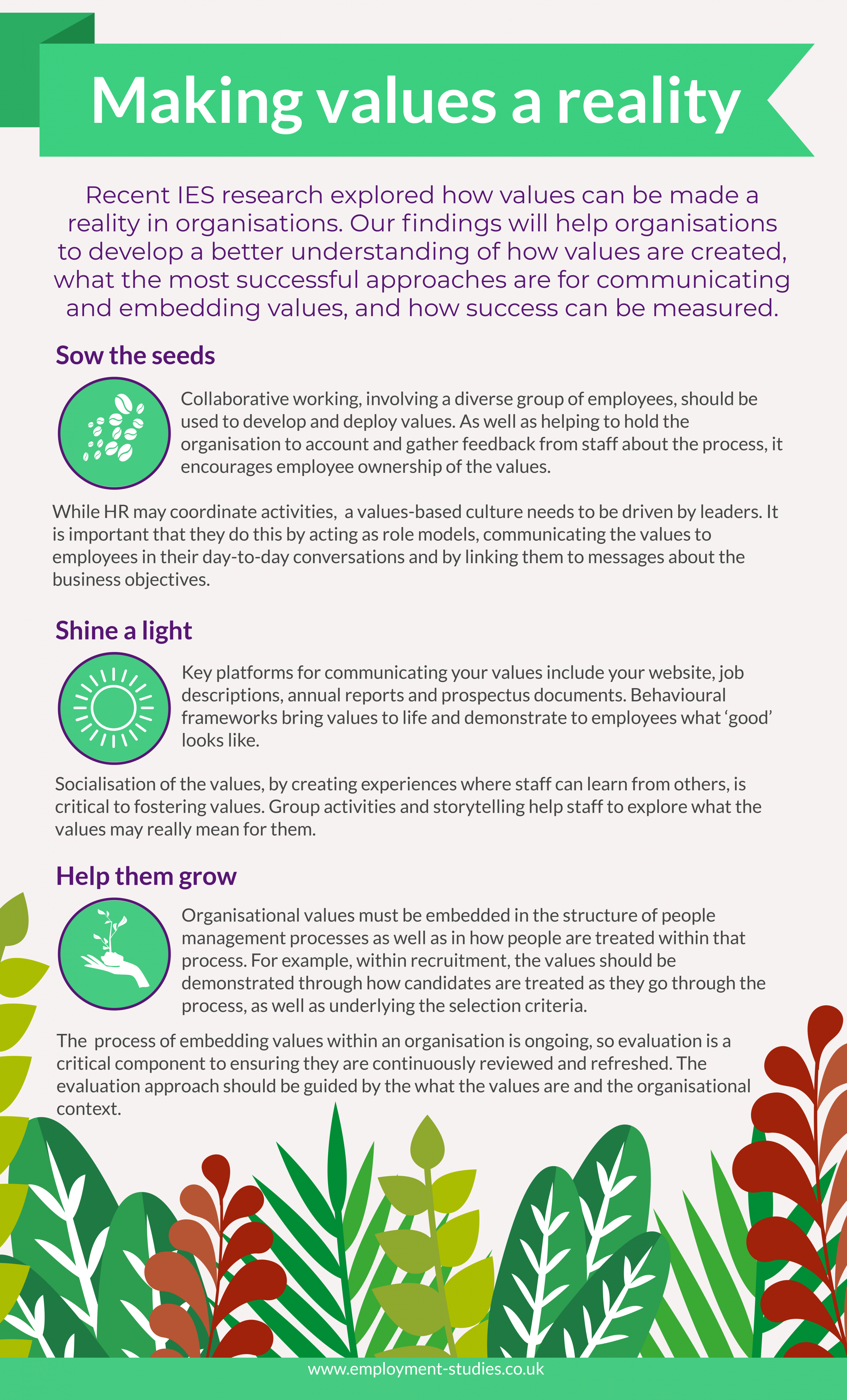values blog
Values exist within every organisation. They are the deep-seated, core principles that an organisation wishes its employees to follow in their behaviour, work, and decision-making. Research shows that many organisations decide to identify what those values are with the aspiration that they will provide a moral compass for how their employees behave while at work. But all too often the values that are defined end up on a faded poster or discarded mug, only to be enthusiastically rolled out at the annual corporate away day, and then forgotten about again. So how can organisations make sure their values become fully embedded and a meaningful part of the business? Recent research by IES explored just that.
One way to think about making values a reality, is to imagine your organisations values like growing a plant. The process starts by sowing the metaphorical seeds; discussing the purpose of developing values with staff and what the benefit is of having them. Then develop and define the values through collaboration with a diverse group of employees who provide a nutrient-rich soil of different viewpoints, experiences, and backgrounds. Co-creation of values is critical to ensure they are supported by employees; research found that only 30 per cent of personal values are also championed by employers.

Like a plant, the climate for embedding values is important. The process needs to be driven by leaders through role-modelling and communication of the values in everyday conversations, activities, and practices. Displaying your values in places that staff interact and engage with often is important, but be careful not to overwater! Constant communication of the values may not always be beneficial and could lead to cynicism without significant action. Supportive communications from leaders may be needed, especially when values are aspirational or developed following a period of change. This will reassure and encourage employees about what is expected of them and prevent employees from highlighting where other work colleagues are not living them.
Once the values are defined, and employees know what they are, the next step is to shine a light on how the values relate to employee’s behaviour and work. Behavioural frameworks are commonly used to bring values to life and demonstrate to employees what living values looks like. Methods for defining behaviours typically involve working with employees to consider what ‘good’ looks like. Creating activities where staff can evaluate themselves or the organisation against the values, share stories of when each other have lived the values, and reward employees who demonstrate the values can also help re-enforce the importance and benefits of the values and foster meaningful links with their work. Providing leaders with the freedom to be creative in developing their own ways of socialising the values in their offices and teams is one method for increasing ownership of the values amongst leaders.
To help your values grow, they also need to be rooted in your people management processes. This can be done in two ways: by considering how the values can be embedded in the structure of the process and demonstrating how people are treated within that process. To increase alignment of organisational actions with organisational values, research suggests that HR professionals should consider if the systems and processes achieve your business objectives; if systems and processes promote behaviours associated with your core values; and have any processes that conflict with your core values been removed? Key people management processes to embed organisational values include attraction and recruitment, induction, performance management, promotion and reward, and training and development.
Embedding values into an organisation is an ongoing process, and they will need continuous weeding and pruning to ensure they remain healthy and alive. Evaluation is critical to measure how successfully the values are embedded and reviewing the activities you are undertaking to keep them fresh. When considering evaluation, you need to think about what is being measured, what the most appropriate method is, and what resources are available, all of which guided by the what the values are, and the organisational context.
Established values need to be grown using a collaborative and evidence-based approach and nurtured regularly to ensure the climate allows them to blossom. Encourage the values to branch through everything you do within your organisation, weaving their vines through your people, practices, and processes.
